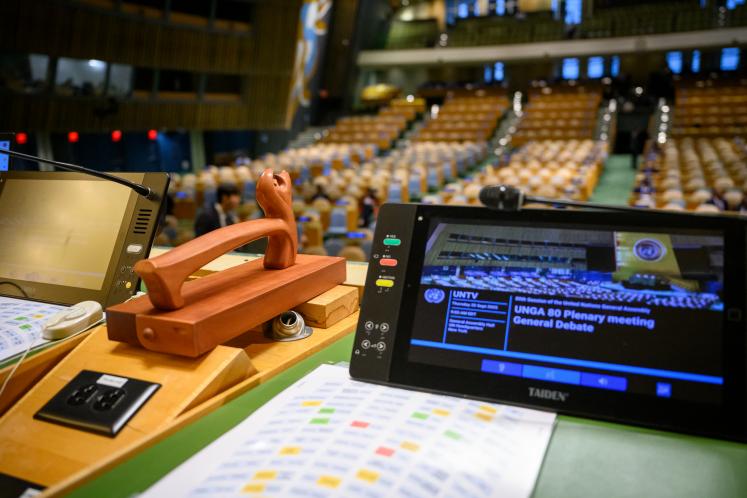This article was originally published in Geneva Solutions.
The last nine months have been dismal for the United Nations. Major cuts by the United States and other donors have led to large-scale reductions in staff, the cancellation of programmes and questions about the future of the organisation as a whole. With all eyes fixed on layoffs and austerity, it is easy to forget that the most important step is still to come: reforming the UN’s architecture. Recent proposals unveiled by UN secretary general António Guterres ahead of the General Assembly high-level week in New York called for a “paradigm shift” towards a more coherent system. The process is now moving into the hands of member states.
If the UN is to survive and stay relevant, this new architecture must build on what works – and much of that is in Geneva. Five strengths in particular could anchor a more resilient multilateral system.
Science, technology and diplomacy
Many of the UN’s most successful examples of science-policy integration are based in Geneva, from the Biological Weapons Convention to the Intergovernmental Panel on Climate Change. It’s where crucial science-based treaties are being negotiated, including on pandemic preparedness and plastics pollution. A vibrant ecosystem of science-policy practitioners has grown over the past decade, linking diplomats, researchers and civil society, and creating connective tissue across communities.
This expertise, coupled with Switzerland’s neutrality, makes Geneva an ideal venue for tackling emerging technologies, including artificial intelligence, biotechnology and other fast-moving fields where political tensions run high but technical expertise is indispensable.
Anticipating global risks
One of the UN’s greatest needs today is to better anticipate systemic risks before they cascade into crises. Geneva already plays a central role in this. The World Meteorological Organization provides authoritative early warnings on climate extremes and weather-related disasters. The World Health Organization (WHO) has built systems for tracking outbreaks and anticipating global health emergencies. Humanitarian actors in Geneva, including the UN Office for the Coordination of Humanitarian Affairs (Ocha), co-based in New York, and the Red Cross Movement, are investing in foresight and scenario planning to prepare for tomorrow’s emergencies before they hit.
In trade and finance, Geneva’s institutions are integrating risk anticipation into their frameworks, recognising how shocks in one sector spill into others. Strengthening this foresight capacity – and making Geneva an even stronger hub for global anticipation – would answer the secretary general’s call for better preparedness in a world of cascading risks.
Humanitarian action and saving lives
The most important measure of the UN is the lives saved through its daily operations. Geneva is where much of that humanitarian system is conceived, coordinated and modernised. The WHO mobilises in crises, the UN Refugee Agency protects millions, while Ocha and humanitarian networks are pioneering new approaches to data use and digital response. In today’s difficult political climate, sustaining public trust in international solidarity requires a strong, modern humanitarian system. Investing here is not only about saving lives, it is about reminding current and future generations why the UN exists.
Universality and convening power
Geneva’s DNA is rooted in universality and inclusion. It has long been a place where governments, NGOs and experts can engage in ways that are sometimes harder elsewhere. Maintaining that commitment to inclusivity is becoming more difficult in New York and other parts of the world, where rising nationalism, visa restrictions and political polarisation are making participation harder.
Geneva’s long tradition of neutrality and openness, supported by its dense network of international institutions, keeps the doors open wider than most. While accessibility challenges remain, Geneva continues to provide a neutral, trusted platform where more representative and participatory multilateralism can take shape.
Switzerland is investing
Switzerland is showing real leadership by putting fresh resources into international Geneva at a time when others are pulling back. In June, the Swiss government announced CHF 269 million for 2026-29, plus an extra CHF 21.5 million this year to cover shortfalls and upgrade facilities. These investments keep Geneva’s UN agencies strong and demonstrate Switzerland’s long-term commitment to multilateralism.
Crucially, this comes against the backdrop of major donors reducing their contributions and scaling down support for UN programming. Instead of retreating, Switzerland is stepping up to support international Geneva. This signals to the international community that sustaining and modernising multilateralism remains a core national interest for Switzerland, despite recent cuts to its foreign aid budget.
This is not about Geneva versus New York. Both are indispensable. But as member states shape the future architecture of the UN, Geneva has tested assets that the world cannot afford to weaken. If UN80 is to deliver more than budget cuts, it should build on Geneva's strengths – science, foresight, humanitarian action, universality and steady national support.




